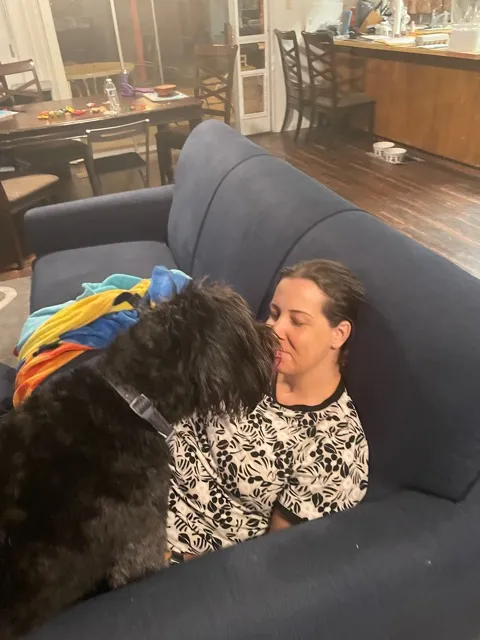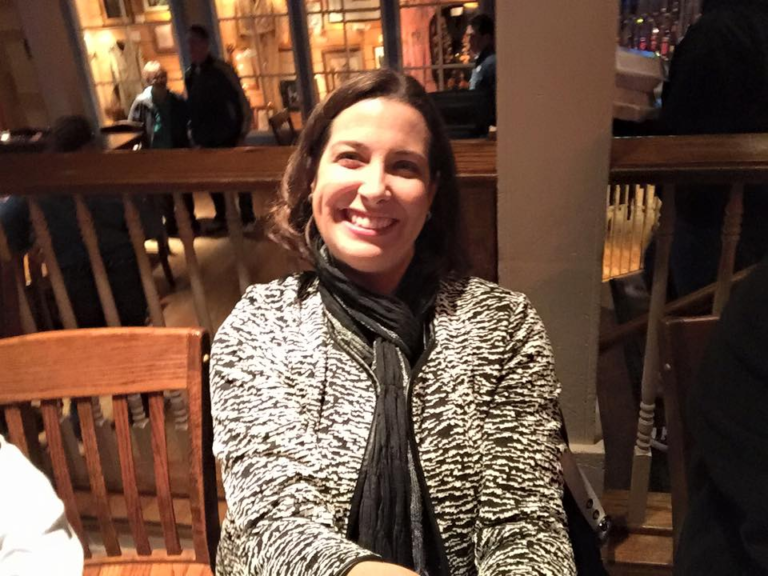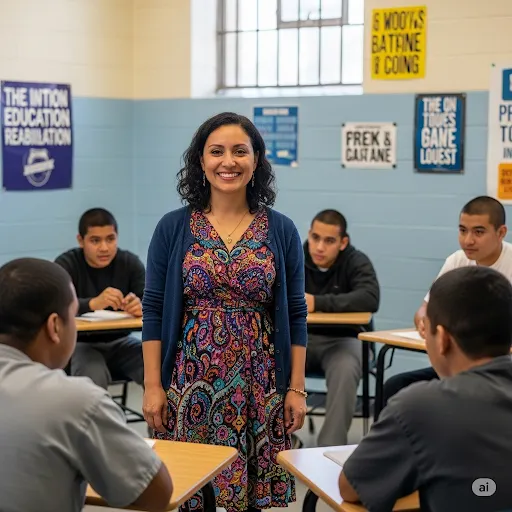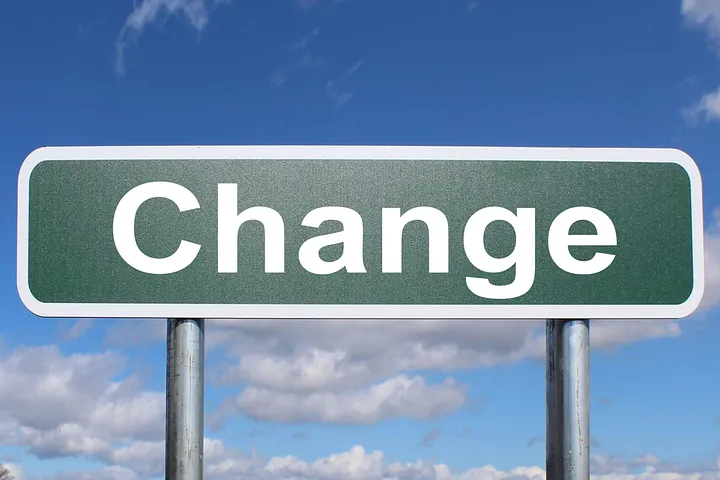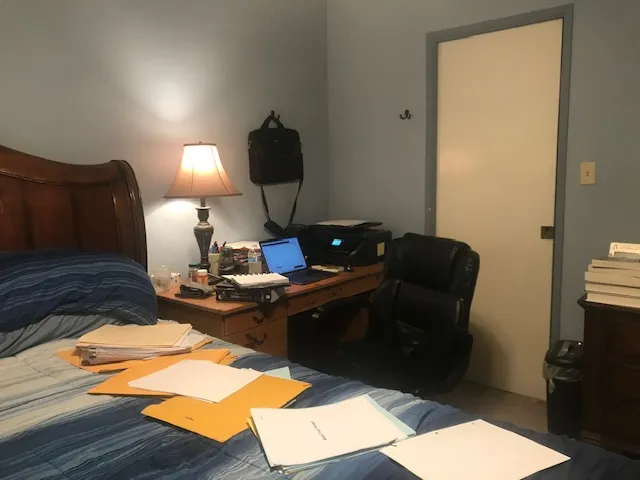Growing Pains: Navigating the Evolution of Prison Education
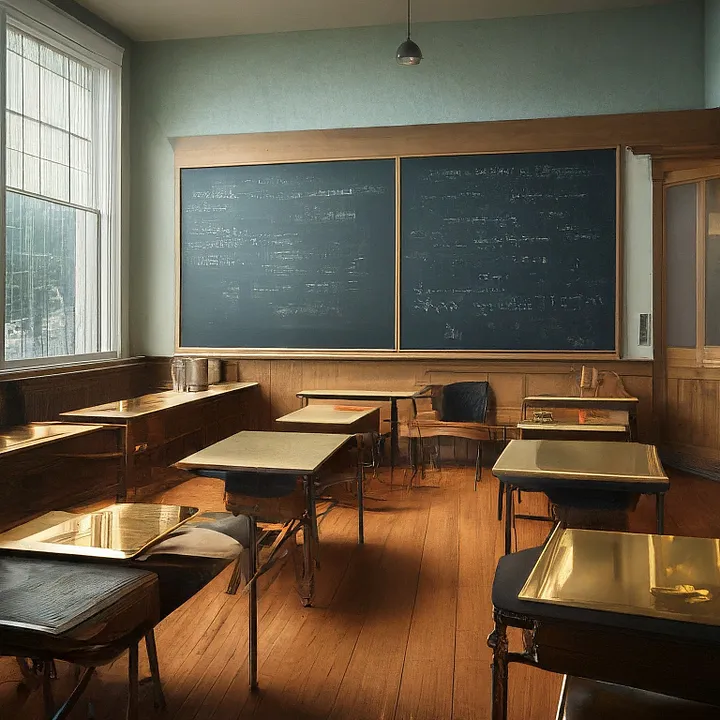
Changes Ahead: There are some many wonderful changes coming soon to education in the prison system. They are wonderful changes, but I am nervous about how it is going to impact me while I am there. I love what I do and believe in it. Education is the path forward to rehabilitation for people currently involved in our criminal justice system, but it is going to present some challenges for those of us who are doing the actual teaching. One of the major changes is that we are going to be including a bigger group of the incarcerated population, which is great progress, but we used to have an entire application process. More people will be able to benefit from our program, but many of them have not proven that they want to be there or actively worked to get into the program. This means that there might be more classroom management problems than we have encountered before. Currently, the incarcerated students are very motivated learners, which makes teaching them enjoyable. They had to have no behavioral problems for six months before they were even considered and in some cases, they had to write an essay or interview with someone to be accepted. By the time they get to me, they are ready to learn and are actually very appreciative of my red pen. They want me to treat them like my main campus students and they work really hard. There are some additional (non educational) benefits to taking classes like time off their sentences (it used to be three weeks and now it is only one). That is not really the reason most of them take classes. They want to change, and they want to learn. This may or may not change moving forward with less restrictions. They might not appreciate it as much. We will have to see if this changes the attitude of a percentage of our student population. It might be the same.
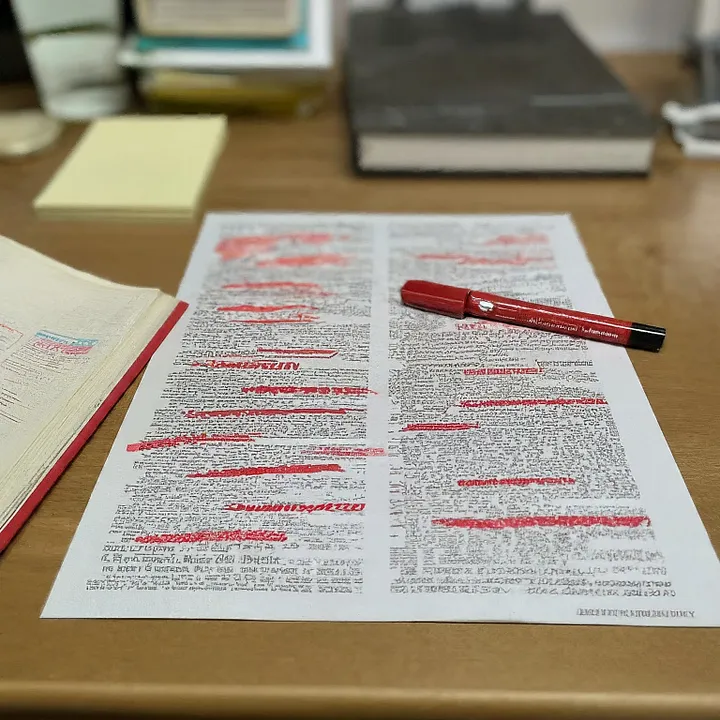
In addition to including more students, we are also going to do the Golden Four first just like the main campus. This means that our students will first complete Math, English, Communication, and Critical Thinking before moving on to the other classes. This has been really great for the main campus as it has increased graduation rates and even pass rates in the other classes. It will be a good idea for our incarcerated students as well. So many times a student (on campus or in the prison) has told me that they wish they had taken my English class before the other classes. My beginning English class teaches the academic essay, and it is the goal of that class to make it easier for students to complete their writing assignments in all the other classes they have to take before graduation. So, I am here for this change, but there is a huge difference when teaching a class of students inside who have had other classes before or a group of newbies. After the pandemic, most of my students were new because they started the program when we were doing correspondence classes. It is not the same. They do not know how to study or behave in class or have group discussions. They interrupt during lectures. I like their manic energy because they are participating, but they are all over the place. If I am the first instructor they meet, we are going to have to spend a lot of time and energy working with them to become good students. This is something that the on campus students could also benefit from (that we used to do), but they are a bit quieter about needing that help. On campus students just fail until they figure it out. My incarcerated students are very loud and needy because they do care, and they do want to do well, but it is tiring.
Now that I have had a bit of a break to process what has been happening in the class and the changes that are coming up, I have had a few ideas about changes in my classroom management style that might help. I am mostly concentrating on ways to keep them focused in class, manage interruptions, and keep the noise level down. In the past, I have been pretty lenient about turning in work during the class because there are so many interruptions and students end up coming in late through no fault of their own, but the students spend a lot of class time working on their homework to turn in before they leave instead of listening to what is going on in class. They end up missing a lot of information since they are trying to multitask. They also interrupt me to turn in their work. Next time I am just not going to accept work during class. They can turn it in at the beginning of the next class. I am hoping this limits their temptation to work on it during class. I do provide some time during class to work on assignments, but they are using the whole class time to do it. I am also going to use a call and response-style method to get their attention during class. Shouting “radio,” which was our usual method, has not been effective lately. Some of the students do not know about “radio,” and many of them will just talk right through it. I am going to see if making them say something in response is better. We are also working with the writing center to get more services to the students, and hopefully we can work on some of these skills in that space as well.
I am taking a break from working in the prison this Fall. I was burned out. It has been a long few years. I have had two to three prison classes every semester (excluding summer) since 2019. We have had a global pandemic, correspondence classes, and started incorporating laptops into our classes. There has been a lot. A few years ago, my dean said something about requiring every Rising Scholar’s professor to take time off every once in a while to avoid burnout. At the time, I was fine and did not want to take time out. Most of us did not want to do that. I thought he was worrying about nothing. After five years, I am realizing how wise he was. My plan moving forward is to take a semester off every few years. This work is hard. It is hugely rewarding. Most of the student whining (while frustrating at the time) actually indicates that they want to succeed. They want to learn. I am hopeful that won’t change.

Changes Ahead: There are some many wonderful changes coming soon to education in the prison system. They are wonderful changes, but I am nervous about how it is going to impact me while I am there. I love what I do and believe in it. Education is the path forward to rehabilitation for people currently involved in our criminal justice system, but it is going to present some challenges for those of us who are doing the actual teaching. One of the major changes is that we are going to be including a bigger group of the incarcerated population, which is great progress, but we used to have an entire application process. More people will be able to benefit from our program, but many of them have not proven that they want to be there or actively worked to get into the program. This means that there might be more classroom management problems than we have encountered before. Currently, the incarcerated students are very motivated learners, which makes teaching them enjoyable. They had to have no behavioral problems for six months before they were even considered and in some cases, they had to write an essay or interview with someone to be accepted. By the time they get to me, they are ready to learn and are actually very appreciative of my red pen. They want me to treat them like my main campus students and they work really hard. There are some additional (non educational) benefits to taking classes like time off their sentences (it used to be three weeks and now it is only one). That is not really the reason most of them take classes. They want to change, and they want to learn. This may or may not change moving forward with less restrictions. They might not appreciate it as much. We will have to see if this changes the attitude of a percentage of our student population. It might be the same.

In addition to including more students, we are also going to do the Golden Four first just like the main campus. This means that our students will first complete Math, English, Communication, and Critical Thinking before moving on to the other classes. This has been really great for the main campus as it has increased graduation rates and even pass rates in the other classes. It will be a good idea for our incarcerated students as well. So many times a student (on campus or in the prison) has told me that they wish they had taken my English class before the other classes. My beginning English class teaches the academic essay, and it is the goal of that class to make it easier for students to complete their writing assignments in all the other classes they have to take before graduation. So, I am here for this change, but there is a huge difference when teaching a class of students inside who have had other classes before or a group of newbies. After the pandemic, most of my students were new because they started the program when we were doing correspondence classes. It is not the same. They do not know how to study or behave in class or have group discussions. They interrupt during lectures. I like their manic energy because they are participating, but they are all over the place. If I am the first instructor they meet, we are going to have to spend a lot of time and energy working with them to become good students. This is something that the on campus students could also benefit from (that we used to do), but they are a bit quieter about needing that help. On campus students just fail until they figure it out. My incarcerated students are very loud and needy because they do care, and they do want to do well, but it is tiring.
Now that I have had a bit of a break to process what has been happening in the class and the changes that are coming up, I have had a few ideas about changes in my classroom management style that might help. I am mostly concentrating on ways to keep them focused in class, manage interruptions, and keep the noise level down. In the past, I have been pretty lenient about turning in work during the class because there are so many interruptions and students end up coming in late through no fault of their own, but the students spend a lot of class time working on their homework to turn in before they leave instead of listening to what is going on in class. They end up missing a lot of information since they are trying to multitask. They also interrupt me to turn in their work. Next time I am just not going to accept work during class. They can turn it in at the beginning of the next class. I am hoping this limits their temptation to work on it during class. I do provide some time during class to work on assignments, but they are using the whole class time to do it. I am also going to use a call and response-style method to get their attention during class. Shouting “radio,” which was our usual method, has not been effective lately. Some of the students do not know about “radio,” and many of them will just talk right through it. I am going to see if making them say something in response is better. We are also working with the writing center to get more services to the students, and hopefully we can work on some of these skills in that space as well.
I am taking a break from working in the prison this Fall. I was burned out. It has been a long few years. I have had two to three prison classes every semester (excluding summer) since 2019. We have had a global pandemic, correspondence classes, and started incorporating laptops into our classes. There has been a lot. A few years ago, my dean said something about requiring every Rising Scholar’s professor to take time off every once in a while to avoid burnout. At the time, I was fine and did not want to take time out. Most of us did not want to do that. I thought he was worrying about nothing. After five years, I am realizing how wise he was. My plan moving forward is to take a semester off every few years. This work is hard. It is hugely rewarding. Most of the student whining (while frustrating at the time) actually indicates that they want to succeed. They want to learn. I am hopeful that won’t change.

Changes Ahead: There are some many wonderful changes coming soon to education in the prison system. They are wonderful changes, but I am nervous about how it is going to impact me while I am there. I love what I do and believe in it. Education is the path forward to rehabilitation for people currently involved in our criminal justice system, but it is going to present some challenges for those of us who are doing the actual teaching. One of the major changes is that we are going to be including a bigger group of the incarcerated population, which is great progress, but we used to have an entire application process. More people will be able to benefit from our program, but many of them have not proven that they want to be there or actively worked to get into the program. This means that there might be more classroom management problems than we have encountered before. Currently, the incarcerated students are very motivated learners, which makes teaching them enjoyable. They had to have no behavioral problems for six months before they were even considered and in some cases, they had to write an essay or interview with someone to be accepted. By the time they get to me, they are ready to learn and are actually very appreciative of my red pen. They want me to treat them like my main campus students and they work really hard. There are some additional (non educational) benefits to taking classes like time off their sentences (it used to be three weeks and now it is only one). That is not really the reason most of them take classes. They want to change, and they want to learn. This may or may not change moving forward with less restrictions. They might not appreciate it as much. We will have to see if this changes the attitude of a percentage of our student population. It might be the same.

In addition to including more students, we are also going to do the Golden Four first just like the main campus. This means that our students will first complete Math, English, Communication, and Critical Thinking before moving on to the other classes. This has been really great for the main campus as it has increased graduation rates and even pass rates in the other classes. It will be a good idea for our incarcerated students as well. So many times a student (on campus or in the prison) has told me that they wish they had taken my English class before the other classes. My beginning English class teaches the academic essay, and it is the goal of that class to make it easier for students to complete their writing assignments in all the other classes they have to take before graduation. So, I am here for this change, but there is a huge difference when teaching a class of students inside who have had other classes before or a group of newbies. After the pandemic, most of my students were new because they started the program when we were doing correspondence classes. It is not the same. They do not know how to study or behave in class or have group discussions. They interrupt during lectures. I like their manic energy because they are participating, but they are all over the place. If I am the first instructor they meet, we are going to have to spend a lot of time and energy working with them to become good students. This is something that the on campus students could also benefit from (that we used to do), but they are a bit quieter about needing that help. On campus students just fail until they figure it out. My incarcerated students are very loud and needy because they do care, and they do want to do well, but it is tiring.
Now that I have had a bit of a break to process what has been happening in the class and the changes that are coming up, I have had a few ideas about changes in my classroom management style that might help. I am mostly concentrating on ways to keep them focused in class, manage interruptions, and keep the noise level down. In the past, I have been pretty lenient about turning in work during the class because there are so many interruptions and students end up coming in late through no fault of their own, but the students spend a lot of class time working on their homework to turn in before they leave instead of listening to what is going on in class. They end up missing a lot of information since they are trying to multitask. They also interrupt me to turn in their work. Next time I am just not going to accept work during class. They can turn it in at the beginning of the next class. I am hoping this limits their temptation to work on it during class. I do provide some time during class to work on assignments, but they are using the whole class time to do it. I am also going to use a call and response-style method to get their attention during class. Shouting “radio,” which was our usual method, has not been effective lately. Some of the students do not know about “radio,” and many of them will just talk right through it. I am going to see if making them say something in response is better. We are also working with the writing center to get more services to the students, and hopefully we can work on some of these skills in that space as well.
I am taking a break from working in the prison this Fall. I was burned out. It has been a long few years. I have had two to three prison classes every semester (excluding summer) since 2019. We have had a global pandemic, correspondence classes, and started incorporating laptops into our classes. There has been a lot. A few years ago, my dean said something about requiring every Rising Scholar’s professor to take time off every once in a while to avoid burnout. At the time, I was fine and did not want to take time out. Most of us did not want to do that. I thought he was worrying about nothing. After five years, I am realizing how wise he was. My plan moving forward is to take a semester off every few years. This work is hard. It is hugely rewarding. Most of the student whining (while frustrating at the time) actually indicates that they want to succeed. They want to learn. I am hopeful that won’t change.

